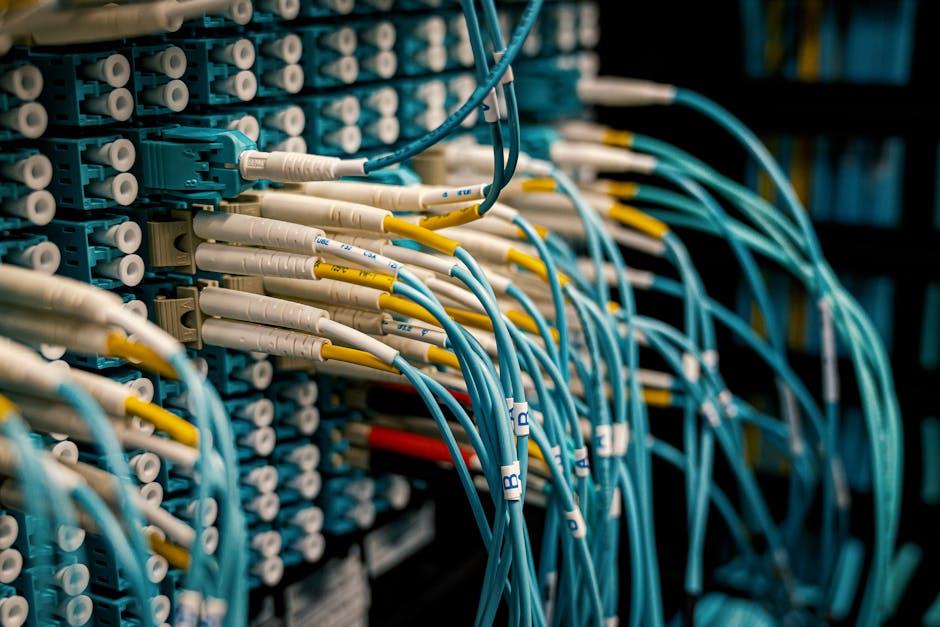Network Cabling Contractor Near Me: Top 5 Budget-Friendly Picks
Introduction
Finding the best Network Cabling Contractor Near Me doesn’t have to be hard, even if you’re on a budget. There are many reliable and experienced providers out there. You can get your office or home network set up without spending too much. AccuTech Communications has been a trusted name since 1993. They offer a wide range of network cabling solutions for different business needs, all with competitive pricing and high standards of service.
Before diving deep into how to pick the best contractor and the specifics of network cabling types, let’s take a closer look at why AccuTech Communications is highlighted for their budget-friendly services.

Understanding Network Cabling
When it comes to setting up a reliable network, understanding the different types of network cables is crucial. Each type offers unique benefits and is suited for specific applications. Here, we’ll break down the four main types of network cables: coaxial, shielded twisted pair, unshielded twisted pair, and fiber optic.
Coaxial Cable
Coaxial cables are one of the oldest types of network cabling. They consist of a single copper conductor at the center, surrounded by a plastic layer for insulation and a metallic shield. This design helps to block signal interference.
- Best Use: Commonly used for cable television and some internet connections.
- Pros: Durable and resistant to signal interference.
- Cons: Bulkier and less flexible compared to other types.
Shielded Twisted Pair (STP)
Shielded twisted pair (STP) cables feature pairs of wires twisted together, with each pair surrounded by a shielding material. This shielding helps to reduce electromagnetic interference (EMI).
- Best Use: Environments with high EMI, such as industrial settings.
- Pros: Offers better protection against interference compared to unshielded cables.
- Cons: More expensive and harder to install due to the shielding.
Unshielded Twisted Pair (UTP)
Unshielded twisted pair (UTP) cables are similar to STP cables but without the shielding. They are the most common type of network cabling, especially in residential and office settings.
- Best Use: General networking needs, including home and office networks.
- Pros: Flexible, easy to install, and cost-effective.
- Cons: More susceptible to EMI compared to shielded cables.
Fiber Optic Cable
Fiber optic cables use light to transmit data, offering incredibly high speeds and long-distance capabilities. They consist of a core made of glass or plastic fibers, surrounded by cladding and protective layers.
- Best Use: High-speed data transfer over long distances, such as in data centers and large corporate networks.
- Pros: Extremely fast and capable of transmitting data over long distances without loss.
- Cons: More expensive and fragile compared to copper cables.

Choosing the Right Cable
Selecting the right type of cable depends on your specific needs and environment. For instance, if you need to set up a home network, UTP cables are often sufficient and cost-effective. For industrial applications with high EMI, STP cables are a better choice. For the fastest speeds and long-distance data transmission, fiber optic cables are the way to go.
Understanding these basics will help you make informed decisions when discussing your needs with a Network Cabling Contractor Near Me.
Next, we’ll explore the top budget-friendly network cabling contractors in your area.
How to Choose the Right Network Cabling Contractor Near Me
When you’re searching for a Network Cabling Contractor Near Me, consider several critical factors. Your choice can make or break your network infrastructure, so here are some key points to guide your decision.
Certified Service
Always opt for a contractor with certified services. Certifications ensure that the technicians are trained and adhere to industry standards. For instance, AccuTech Communication provides certified and reliable services, backed by nationwide access to Avaya/Nortel manufacturer support. This means you can trust their expertise for optimized network infrastructure.
Competitive Pricing
Budget is a significant concern for most businesses. Look for contractors who offer competitive pricing without compromising on quality. AccuTech Communication is known for its competitive pricing, making it a budget-friendly choice for many businesses. They offer comprehensive solutions that cover everything from network cabling to business phone systems.
Customer Reviews
Customer feedback is invaluable. Reviews can give you insights into a company’s reliability and quality of service. For instance, AccuTech has received glowing testimonials from clients who appreciate their quick response times and knowledgeable staff. One healthcare provider mentioned, “AccuTech is a critical partner in helping us serve our patients,” highlighting their reliability and excellent service.
Local Expertise
Choosing a contractor with local expertise can be a game-changer. Local companies understand the specific needs and regulations of your area. AccuTech, for example, has been serving Massachusetts, New Hampshire, and Rhode Island since 1993. Their deep understanding of local requirements ensures that your project will be compliant and efficient.
By focusing on these factors—certified service, competitive pricing, customer reviews, and local expertise—you can find the best Network Cabling Contractor Near Me to meet your needs.
Steps to Install Network Cabling
Installing network cabling can seem complex, but breaking it down into manageable steps makes it easier. Here’s how to do it:
1. Central Hub
The central hub, or network switch, is the heart of your network. It connects all your devices and manages data traffic. The hub should be placed in a central, accessible location to ensure even cable distribution.
Example: In a small office, the central hub could be in a server room or a dedicated closet.
2. Outlet Creation
Next, decide where you need network outlets. These are the points where devices like computers, printers, and phones will connect to the network.
Pro Tip: Plan for future growth by installing more outlets than you currently need.
3. Cable Running
Now, run the cables from the central hub to each outlet. This can involve drilling holes, threading cables through walls, and using cable trays to keep things organized.
Types of Cables:
– Cat 5e: Suitable for small-to-medium networks.
– Cat 6: Ideal for high-performance needs.
– Fiber Optic: Best for high-speed data over long distances.
4. Connection
Once the cables are in place, connect them to the network switch at the central hub and to the outlets. Use patch panels to organize and manage connections at the hub.
Note: Ensure all connections are secure to avoid future issues.
5. Testing
Finally, test the entire system to make sure everything works correctly. Use cable testers to check for continuity and signal strength. This step ensures that your network is ready for use.
Case Study: AccuTech Communication offers testing and certification services to verify that your cabling system meets industry standards.
By following these steps, you can set up a reliable and efficient network. Up next, we’ll answer some frequently asked questions about network cabling contractors.
Frequently Asked Questions about Network Cabling Contractors
What are the 4 types of network cables?
Network cables come in various types, each suited for specific needs:
- Coaxial Cable: Often used for cable television and internet, coaxial cables are durable and can handle high-frequency signals.
- Shielded Twisted Pair (STP): These cables have a shielding layer to protect against electromagnetic interference (EMI). They are ideal for environments with high EMI.
- Unshielded Twisted Pair (UTP): Commonly used in Ethernet networks, UTP cables are more affordable and easier to install but are less resistant to EMI.
- Fibre Optic Cable: Best for high-speed data transfer over long distances, fibre optic cables use light to transmit data, offering superior speed and reliability.
What does a cabling company do?
A cabling company provides a range of services to ensure your network operates smoothly:
- Installation: Setting up network cables, outlets, and central hubs. This includes creating a structured cabling system that meets your needs.
- Maintenance: Regular inspections and upkeep to ensure the network remains in optimal condition.
- Troubleshooting: Identifying and resolving issues that may arise, such as connectivity problems or signal loss.
- Service Improvement: Upgrading existing cabling systems to enhance performance and adapt to new technologies.
How to do network cabling?
Setting up network cabling involves several steps:
- Central Hub: Begin by establishing a central hub where all network cables will converge. This is often a server room or a network closet.
- Outlet Creation: Plan and install network outlets throughout the building. These outlets will connect individual devices to the network.
- Cable Running: Run the network cables from the central hub to each outlet. Make sure to use high-quality cables and follow best practices for cable management.
- Connection: Connect the cables to the appropriate devices, such as routers, switches, and computers.
- Testing: Finally, use cable testers to check for continuity and signal strength. This step ensures that all connections are secure and the network is fully operational.
By understanding these basics, you can better appreciate the work done by a Network Cabling Contractor Near Me and ensure your network setup is efficient and reliable.
Conclusion
Choosing the right network cabling contractor is crucial for a reliable and efficient network setup. At AccuTech Communications, we pride ourselves on providing certified service and competitive pricing to meet your needs.
With over two decades of experience, we’ve built strong relationships with our clients in Massachusetts, New Hampshire, and Rhode Island. Our team of skilled technicians ensures that your network infrastructure is optimized for peak performance, whether you’re a small business or a large corporate campus.
We offer a comprehensive range of services, from structured cabling to wireless networking solutions. Our commitment to quality and customer satisfaction has earned us the trust of numerous businesses across the region.
So, if you’re looking for a Network Cabling Contractor Near Me, look no further than AccuTech Communications. We are here to make your network stronger and more reliable.
Contact us today to request an estimate and see how we can help you with your network cabling needs!


